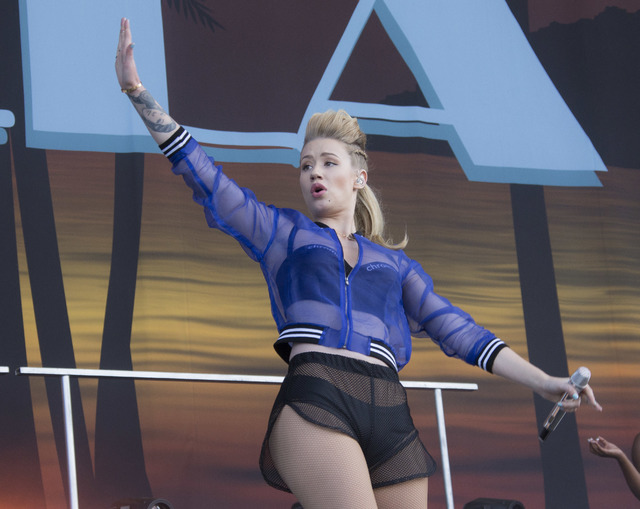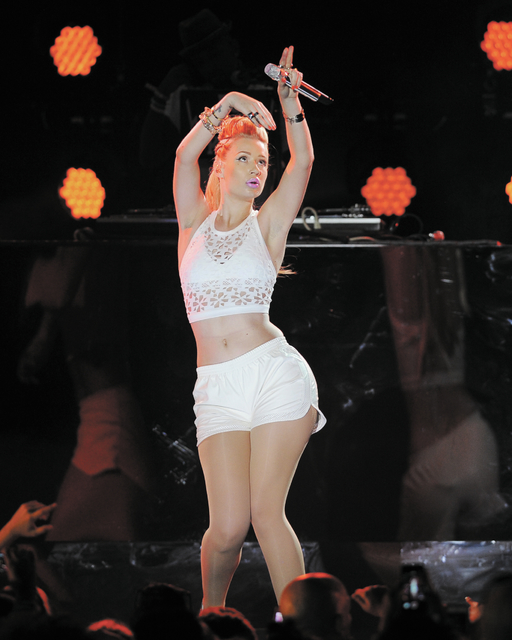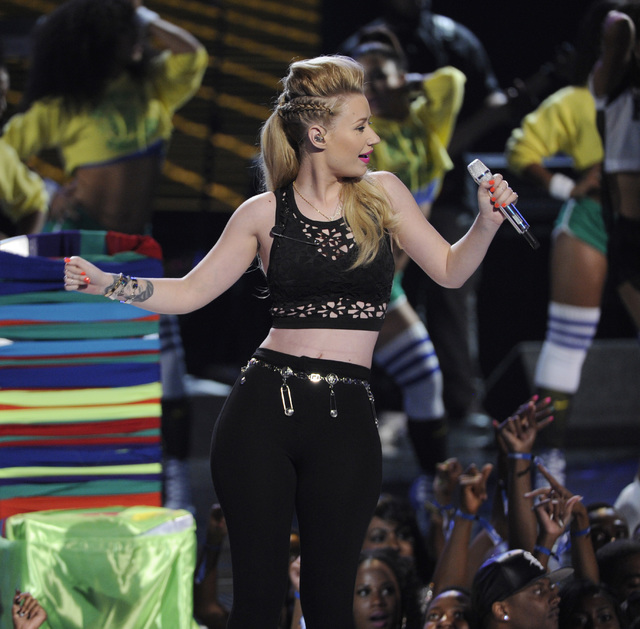Hip-hop community reluctant to embrace chart-topping Aussie MC Iggy Azalea
It’s a black and white issue, in the most literal sense.
Iggy Azalea.
She’s a white girl indebted to black culture.
More specifically, she’s a blond rapper from Australia whose full-length debut, the audaciously, if somewhat misleadingly titled “The New Classic,” released in April, has spawned a number of hit singles, the biggest of which, “Fancy,” is one of the top-selling songs of the year.
“Fancy” hit No. 1 on the Billboard singles chart and stayed there for seven consecutive weeks, the longest run any female rapper has ever enjoyed.
The song has been streamed more than 78 million times on Spotify, with Azalea rhyming of sloshing Champagne and staying strong in the face of those omnipresent haters over a simple, ’80s-sounding synth line, gang vocal chants and a lazy, clapping beat.
She does so in the dialect and drawl of an African-American woman from the Deep South.
As such, Azalea has been accused of cultural appropriation, of being a musical carpetbagger mining a culture that’s not her own.
Because of this, she has been dismissed overtly by hip-hop purists and more subtly by the likes of fellow female MC Nicki Minaj during an acceptance speech at the BET Awards.
As swiftly as she has risen up the charts, Azalea has become a lightning rod for criticism.
She shouldn’t be, at least not for the argument in question (her rap skills are much more open for scrutiny).
First off, culture is an open-ended thing, it doesn’t exist in a vacuum.
It both absorbs and is there to be absorbed.
Ultimately, this is what enables a given culture to continually grow and develop, its permeability, and the free exchange of ideas from one group of people to the next.
Hip-hop is a prime example of as much.
Yes, it’s both a music and a culture that originated in the African-American community.
But from the very genesis of rap, it was directly incorporating influences outside itself.
The first hip-hop song to break into the top five of the Billboard singles chart, the music’s first legitimate pop hit, was Run DMC’s take on Aerosmith’s “Walk This Way,” while one of the most significant and influential early hip-hop songs, “Planet Rock” by Afrika Bambaataa &the Soulsonic Force, which introduced the Roland 808 drum machine to the genre, was directly indebted to Japanese electronic troupe Yellow Magic Orchestra and German electronic music pioneers Kraftwerk.
So, basically, two of the cornerstones of hip-hop were abetted, in large part, by a group of longhairs from Boston and a bunch of Japanese and German dudes.
No one talks about cultural appropriation in these contexts, nor should they: Both Run DMC and Bambaataa were creating something new, something unheard of at the time from these sounds that they were inspired by — though Kraftwerk may not have initially seen it that way (Kraftwerk sued Bambaataa’s label Tommy Boy Records and settled out of court for his sampling of their music).
The very idea of sampling, which has long been a staple of hip-hop, is posited on merging different sounds from different artists, a co-mingling of cultures.
It’s the musical embodiment of the marketplace of ideas.
This is one of the things that has kept hip-hop so consistently fresh and relevant, its openness and ability to incorporate sounds outside of itself.
Thing is, that door swings both ways: You can’t willfully borrow from other cultures and then cry foul when others do the same to yours.
Moreover, think of how both parties have benefited from the exchange.
In capturing the hearts and minds of white kids the world over, hip-hop broadened it base to the extent that it’s arguably become the biggest, most influential form of music there is, its fingerprints everywhere, from much of contemporary country music to rock, metal to electronic dance music, pop to polka (Seriously. Google it.)
White audiences were instrumental in helping to popularize the music, providing the larger audiences crucial in enabling it to graduate from inner-city streets to sold-out arenas and make millionaires out of its biggest stars.
Would anyone seriously suggest that it’s OK for white people to consume the music, to be inspired by it and yet, in turn, have no relationship with the music other than as its patrons?
Some seem to think so.
Earlier this year, rapper Prodigy of the great hip-hop duo Mobb Deep lashed out on Twitter against a white music critic who positively reviewed the reissue of the group’s seminal 1995 “The Infamous.”
“If u don’t come from our blood stream how can u make a proper assessment of our music? U don’t understand it. U a outsider peeking in,” Prodigy wrote.
This is from a guy whose group once toured with Limp Bizkit, who gladly cashed plenty of checks based on support from white guys like the journalist in question.
But Prodigy’s argument is not uncommon in hip-hop — it also applies directly to much of the criticism of Iggy Azalea — and it all boils down to the question of authenticity.
If you’re not a member of African-American culture, how can you create or comment in any real, meaningful way upon music that germinates from said culture?
But here’s the thing: Someone like Azalea isn’t co-opting said culture or attempting to claim ownership of it so much as she’s filtering it through a culture of her own.
Yes, she’s indebted to it, but she’s also doing her own thing with it, much like Bambaataa did with Kraftwerk’s music.
The rise of someone such as Iggy Azalea isn’t an affront to hip-hop culture, then, but yet another testament to its power and reach.
Seriously, think about it, a 24-year-old white girl from halfway around the world making waves in hip-hop?
Fancy that.
Contact reporter Jason Bracelin at jbracelin@reviewjournal.com or 702-383-0476. Follow on Twitter @JasonBracelin.
Preview
Iggy Azalea
9 p.m. Saturday
Boulevard Pool at The Cosmopolitan of Las Vegas, 3708 Las Vegas Blvd. South
$47.75 (800-745-3000)




















